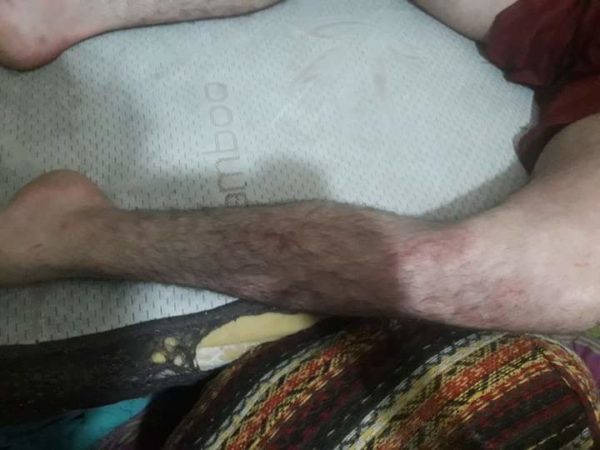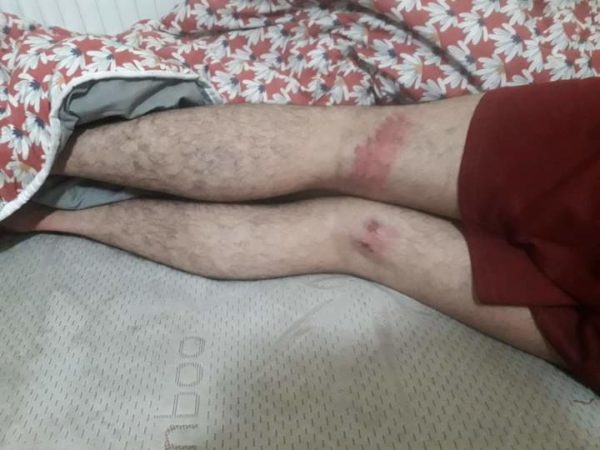The respondent, a 21-year-old Palestinian man, describes a violent pushback from Greece – of which this was his 6th. Of the previous, four had occured on the land border and two at sea. This latest incident involved the use of the tactics of pushbacks to the islets in the Evros/Meriç river. The respondent describes that two people died during the pushback, one Pakistani, and one Palestinian who was his friend. This incident took place within a period of three days in which multiple pushbacks to several islets of the Evros/Meriç river were conducted.
The respondent had crossed the border to Greece in a group of 27. The transit group included Pakistani, Afghani, Palestinian, Syrian, Yemeni and Jordanian (amongst others), aged mostly between 15 and 27 years, also including children and women.
It was around 9pm on 7th April when the group were apprehended. They were walking and then heard a gunshot in the air and officers shouting. Suddenly they found themselves surrounded by officers. The officers found the group using a torch, remarked the respondent. The officers immediately grabbed everyone in the group and tied their hands behind their back with plastic cable ties/zip ties. They were told to keep their heads down, and if anyone rose their head, the officers beat and hit them.
The respondent explained that there were eight officers in total. The respondent said that the officers spoke in different languages to them – German, Russian, Hebrew and Greek. “Russian” was an identified language by a Yemeni member of the group who identified the language as he speaks Russian. “Hebrew” was identified by the respondent as one of the officers allegedly communicated to him in Hebrew. The one who spoke in German was “nice to us” explained the respondent. The German speaking officer wore all black clothing with a balaclava. Two other officers wore the same clothes, as well as a balaclavas. The black clothing had markings and writing but he was not able to identify what exactly those markings or words were due to having a torch shone in his face and he did not recognise the writing either. The respondent described that these officers were holding “pistols” and batons. One of the officers was holding a big gun/rifle. One of the officers shot the boat the group were carrying when they were apprehended.
One of the other officers was described as wearing a sage green and black military uniform. This officer too was hiding his face with a balaclava, which was sage green, matching his uniform. The respondent identified this officer as Greek.
The other four officers were unidentifiable by the respondent as the light from the torches being shone at him was very bright, making it difficult to see. He did identify that all of the officers were wearing balaclavas. The respondent also remarked that there was writing on some of the uniforms, but he could not see the words, nor could he remember which exact uniforms had writing.
One Palestinian man from the group, just as the officers appeared, got scared and ran back to the river and thus successfully escaped while the rest of the group were arrested. The next day, the respondent explained that there was a body discovered in the river and he believes it was his friend. The respondent heard news of this death over a radio channel when he made it back to Istanbul and later saw a social media post about it which confirmed his belief that it was his friend.
The rest of the group, now 26, were arrested as described above. While they were forced to look at the ground and had their hands tied, they were subjected to body searches. The officers took some of their phones, some of their money and their food supplies. They were also forced to take off some of their items of clothing.
The one officer who reportedly spoke in Hebrew was insulting the group. He was asking “where we were from” in English, and telling the group to “go back to the sea” and “go back to the river”.
When the officers spoke to the whole group, they spoke in English. The Hebrew speaking officer, counted the transit group members. This officer was dressed in a military camouflage uniform, but the respondent could not give any more details as to his appearance.
There were two cars accompanying the eight officers, which were identified as “white police cars”, that had “writing of ‘police’ in Greek on them”. The respondent explained that there were some numbers like “3” and “0” on the sides of these vehicles, but he could not see exactly as they were parked a bit away from the group.
The group were made to sit with their head down, hands tied with plastic cable ties for three hours. During this time they were questioned on where they were from and beaten with batons for around 30 minutes. Also an electric discharge weapon was used on some of the people in the group. Only two officers had these weapons, both wearing black clothes and masks, but the respondent could not identify the weapon specifically. These officers used these electric discharge weapons on two Palestinians in the group. The respondent said this was because the officers suspected they were smugglers, but the respondent is certain they were not.
One of the Palestinians attacked in this way was the respondents friend who, according to the respondent, still has marks left from the discharge weapon on his arms. These two and most of the other group members were also beaten. The respondent explained that he was not beaten as he was helping translate between people and the officers as he speaks German well and a small bit of English. The respondent explained that he was translating everything that was being said to the group by the officers so everyone could understand.
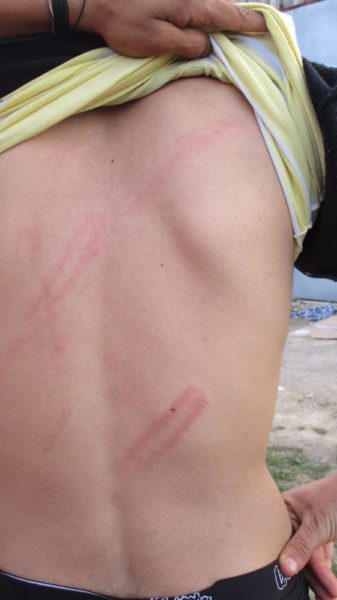
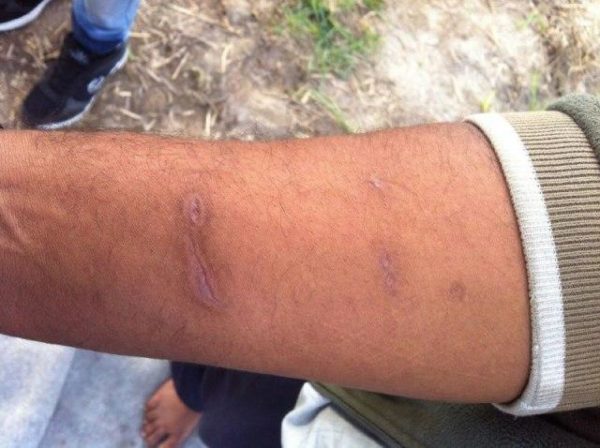
The respondent reported that the women and children were not beaten, but the women were forcibly searched by officers and the children had their food taken from them. The respondent remarked that at both the place of apprehension and the detention site, the women were body searched by male officers. “It was bad,” explained the respondent, “they were insulting us by saying dirty words. It was so harsh”.
After three hours, taking the time to approximately midnight, a small grey mini bus arrived to take the group. The bus had no seats. The group of 26 were taken in this minibus and two officers went with them. The journey took about 40 minutes, and the driving was reckless and fast. The respondent explained that they passed by a village and saw one house and lots of vehicles for construction. The road they drove along was paved.
The minibus arrived at a detention site, which the respondent described as a “military base”. It was surrounded by a barbed wire fence. The respondent identified a large sage green container at the base which was full of people’s bags, belongings, food – everything. There were also three dogs present. There were also four vehicles there: one dark coloured bus, one 4×4 jeep and two military cars.
There were about 15 more officers at this detention site, which the respondent referred to as a “military base”. Two were wearing Greek police uniforms, some others were wearing the same military uniform as the previously mentioned officer that initially apprehended the group, and some others were wearing completely black clothes with balaclavas.
They were ordered to get out of the bus and two officers wearing wearing gloves checked them again. One was wearing all black clothes with no markings, and one was wearing Greek police uniform with a black jacket. Both were wearing balaclavas. One of the officers asked if anyone had a phone, to which some people said no. However, one of the group members who said “no” was found to have hidden a phone and was beaten by the officer for lying.
When officers found phones, they put them into a plastic bag. They also threw away any more food they found among the group. Some of the officers took money that they had found during the search, but others did not take money even when they found it. The respondent explained that when he and the rest of the group were taken back to the border, the officers searched them again and took the remaining money.
Before the respondent’s group was taken into the detention site, another group of what the respondent said was 150 people were taken out of the cell. In this group, there were people from Pakistan and Afghanistan but mostly Syrians. There were three women in the group and children who were 5-6 years old. There were also children in this group that the respondent identified as two young children “who could not walk yet”. When this group walked past them, some of the respondents group asked them where they were going. Some of the 150 people responded saying they were being taken to camps and others said they did not know. These 150 people were loaded into a bus and the respondent stated that “they were taken to the border”.
The respondent explained that before his group was taken into the place of detention, one of his Palestinian friends was ordered to clean “the whole detention centre” before they went inside. This Palestinian boy, who was about 16-17 years old, was a friend of the respondent. He was made to clear the floor of the cell before they went in, as well as in the corridor outside of the cell.
The respondent described the detention sites layout. As he spoke he drew with a stick in the ground a diagram of what the detention centre looked like inside. Below you can see the layout of the detention site:
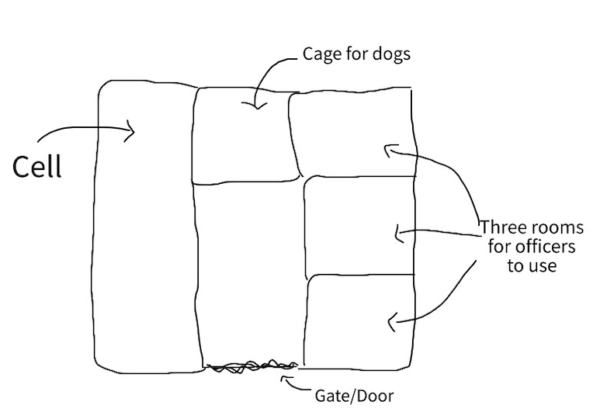
The detention site itself had four small windows and the floor was concrete. Inside, the cell had “old style floor tiles” as flooring. The ceiling of the detention site and inside the room was described as “flint wood”. The building from the outside was pale yellow in colour.
The cell had a place for a toilet but there was no toilet there. There was a water tap and people were drinking from it even though it was not clean. “People were so cold. They took the food from the children”. The group were denied food, water and medical assistance throughout this ordeal.
There were 15 Syrians among the group when they were apprehended. On top of this group of 15, the respondent said there were three Iranians who, when asked, said they were Syrian. After 30 minutes of being detained in the cell, all of these Syrians and the three Iranians were taken out of the cell and given their belongings and their phones back by the officers. They were then taken away. According to the respondent, some of these Syrians contacted him through one of his friends’ phone (who managed to keep it) shortly after, telling him that they were taken to a camp in Greece.
The rest of the group – nine people, all men – was kept in this cell for about five hours. After five hours, at approximately 5-6am on 8th April, they were taken in the same grey minibus that had taken them to the detention site, but this time took them to the river.
This drive was shorter, about 20 minutes long. The driving was again very fast. When they arrived on the riverside in the Evros/Meriç region, they were ordered to get out of the bus and sit on the ground. There were another four men present there wearing balaclavas and dressed all in black clothes with no markings. The respondent thought that these four people were Arabs as they were not speaking much, but he was not sure. They did not say anything apart from “down” and “come” to the group, speaking in English.
There were another two people assisting the police with the boat on the river side. The boat was described as “red” and “small”. One was identified as Syrian, spoke in Arabic, and wore black unmarked clothes. He announced to the group that “if anyone can speak English, you can come work for them [Greek police] for six months and then you will be given papers for asylum”. These papers were described by the respondent as “أشميلار”. From translations made of this word, the respondent seemed to be suggesting this was a type of limited-time ‘residence’ permit. This matches the specification of the “khartiya”, a document issued by Greek authorities for between a month and half a year. The respondent also asserted that it could have allowed them to stay in Greece for “about 6 months”.
The respondent understood what this officer was saying exactly as he also spoke Arabic. The group’s reaction was that they were “disappointed” and “depressed” at what was said by this man. They didn’t think about doing it because it was too “risky” and they thought they may be killed. Because of this, none of the group volunteered.
This same man also spoke to the respondent and asked what the officers took from them. The man seemed to be working with the military and police, and, by the way he was speaking, the respondent believed: “he didn’t want to do that”.
Also, next to the river the respondent explained there was a small building/hut described as a “room” where there was a toilet inside and a place for the officers to sit and eat.
The officers had tied a rope from a tree on the Greek side to the islet that the transit group was taken to. The group thought they were on the Turkish side when they arrived on the island, before realizing it was just an islet.
When they arrived on the islet there was no one else, only the group of 9. The island had nothing, just small bushes. It was described as “just a hill, surrounded by water”. They were on the island for a total of two days. They did not try to cross as it was impossible to because the Greek authorities were present on the Greek side and shouting at the group to go to Turkey, but on the other side the Turkish authorities were shouting at them to go back to Greece. Also, only three of the group could swim. They had no food or water for those two days they were stranded on the islet.
After the two days of being on the islet, on 10th April, three from the group – including the respondent – swam to the Turkish side when the Turkish officers had left. The others waited, some tried using pieces of wood to cross but were unsuccessful.
The respondent explained that another man had passed away when trying to cross to the Turkish side. This man was Pakistani and tried to swim across but the current was strong and he was unsuccessful and got swept away. The respondent explained that he just disappeared. A couple of days later the respondent saw a photo of a body washed up on the river bank which was posted by the Facebook page خلية الإنقاذ و المتابعة / m.r.c and he confirmed it was the same man. This takes the total of deaths during this incident to two people.
When the Turkish authorities had left the bank, the respondent crossed to the Turkish side at around 11am on 10th April. He encountered a group trying to cross to Greece. The respondent asked the group if he could make a call with their phone and he called the number for Red Crescent (02125223030) to help them. His brother could not get across from the island to the Turkish side, so the respondent waited for him by the riverside in Turkey. He made the call at about 7pm on 11th April and waited for the Red Crescent to come. After about two hours at about 9pm a rescue team arrived with a boat, which allowed the rest of the group to cross the river to Turkey safely.
When they crossed and walked further into Turkey, the group was apprehended by Turkish authorities and taken to a detention site in Ipsala, Edirne. The respondent was released as the officers called for a list of 10 peoples names and his name was not on the list. However, his brother is currently still detained as there was someone on the list who has the same name as the respondents brother, so when the name was called out, the respondent’s brother stood up. However, according to the respondent, the correct person was Turkish, and the respondent and his brother are Palestinian. The family were told that there has been a mistake made and the wrong person detained, but the brother is currently still detained. The respondent has not spoken to his brother since he has been released from prison.
